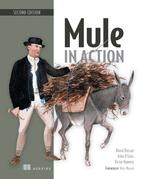| @ContainsTransformer-Methods |
Signals that a class contains transformer methods. |
Method |
annotations |
| @Transformer |
Used to create a Mule transformer from a class method. |
Method |
annotations |
| @Schedule |
Schedules a method for execution using either a simple frequency or cron expression. |
Method |
quartz |
| @IntegrationBean |
A dependency injector annotation used to inject an iBean such as Facebook or Amazon S3 into your component. |
Field |
ibeans |
| @MockIntegrationBean |
Similar to the @IntegrationBean annotation, this one can be used in tests to create a mock instance of an iBean that’s good
for testing the bean without actually making requests to the external service.
|
Field |
ibeans |
| @Lookup |
Dependency injection annotation used to retrieve objects from the registry. |
Field, parameter |
annotations |
| @Payload |
A parameter injection annotation that can be used on component entry points and transformer methods defined using the @Transformer
annotation, this annotation controls how the current message payload is passed into a method by performing automatic transformation
of the message payload to match the annotated parameter type.
|
Parameter |
annotations |
| @InboundHeaders |
Used on component entry points and transformer methods, this annotation controls how the current message inbound headers are
passed into a method. The annotation supports Map, List, single headers, and wildcards.
|
Parameter |
annotations |
| @OutboundHeaders |
Used on component entry points and transformer methods, this annotation controls how the current message outbound headers
are passed into a method. Users can write to this Map to attach headers to the outgoing message.
|
Parameter |
annotations |
| @InboundAttachments |
Used on component entry points and transformer methods, this annotation controls how the current message inbound attachments
are passed into a method. The annotation supports Map, List, single headers, and wildcards.
|
Parameter |
annotations |
| @OutboundAttachments |
Used on component entry points and transformer methods, this annotation controls how the current message outbound attachments
are passed into a method. Users can write to this Map to attach attachments to the outgoing message.
|
Parameter |
annotations |
| @Xpath |
This annotation can be used to execute an XPath expression on the message payload with the result being passed into the method. |
Parameter |
xml |
| @Groovy |
This annotation can be used to execute a Groovy expression on the message payload with the result being passed into the method. |
Parameter |
scripting |
| @Mule |
A parameter injection annotation that can be used on component entry points and transformer methods, this annotation can be
used to execute a Mule expression.
|
Parameter |
annotations |
| @Function |
A parameter injection annotation expression on the message payload with the result being passed into the method, this annotation
exposes a common set of functions used in Mule such as a counter, UUID generator, date and timestamps, etc.
|
Parameter |
annotations |
